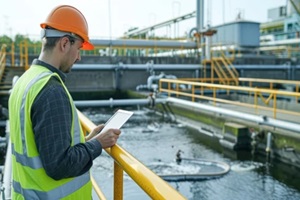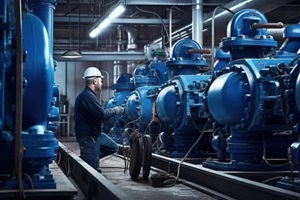 In New Jersey, water safety is important to public health. To help maintain these standards and demonstrate their commitment to public safety, public health officials, water quality analysts, and building operations all rely on advanced water treatment methods and the water treatment companies that provide them.
In New Jersey, water safety is important to public health. To help maintain these standards and demonstrate their commitment to public safety, public health officials, water quality analysts, and building operations all rely on advanced water treatment methods and the water treatment companies that provide them.
More specifically, water safety is absolutely critical for facilities with cooling towers and other HVAC water systems across New Jersey. Ensuring these complex systems meet stringent quality standards is essential for protecting those who work or live near these systems.
Understanding the Importance of Water Safety in NJ
Water safety should be the top priority for any facility in New Jersey operating cooling towers or other HVAC water systems. These critical systems can potentially spread contaminants like Legionella bacteria if not properly treated and maintained.
Upholding stringent water quality protocols is vital for preventing dangerous outbreaks that could lead to serious public health incidents. It is important to understand that biofilm is where bacteria grows within pipes and machinery. Water treatment experts are tasked with mitigating its growth through chemical treatment or even filtration.
Testing and prevention methods become critical during times where air conditioning is in peak use like the summer time, as most larger buildings and facilities are cooled through the use of water systems.
The Health Implications of Compromised Water Quality
The health implications of compromised water quality in cooling towers cannot be overstated. If not properly treated with professional water treatment programs, these systems become the perfect environment for harmful bacteria like Legionella to rapidly multiply. Legionella bacteria can then easily spread through a facility’s air handling and water distribution systems.
This exposes all building occupants to the bacteria through contaminated water sources like showers, sinks, and cooling tower mist. Inhaling aerosolized Legionella puts people at high risk of contracting Legionnaires’ disease, a potentially deadly form of pneumonia with symptoms like fever, chills, cough, and breathing difficulties. Legionella is particularly hazardous for those with compromised immune systems.
New Jersey may soon implement regulations similar to New York City’s Local Law 77 establishing stringent requirements for legionella testing, management plans, and monitoring of cooling towers and other building water systems. Facilities would need to stay ahead of potential new rules to avoid compliance issues, liability risks, and public health incidents.
Community Impact and Public Trust in Water Systems
Beyond health implications, water safety directly impacts community confidence in the buildings and facilities they occupy. A single safety lapse can undermine public trust rapidly. Consider the types of buildings that you go in and out of every day like office or apartment buildings, supermarkets, schools, healthcare facilities, hotels, or even event venues.
Any building with cooling towers or boiler systems that large numbers of people regularly enter and occupy runs the risk of widespread contamination if those water systems are not properly treated and maintained.
The Challenges of Maintaining Water Safety in NJ
Water treatment companies in N.J. face a variety of challenges maintaining water safety for the buildings they service, which are significantly influenced by various factors including its dense population and the conditions of the incoming water for the entire state.
 Environmental Contaminants and Pollution
Environmental Contaminants and Pollution
With New Jersey’s dense population and industrial footprint, environmental contaminants and pollution present a significant challenge for maintaining safe water quality. Air pollution from cars and other forms of transportation can impact a building’s water systems.
Cooling towers are open systems that constantly cycle large volumes of air across the warm water. This air intake can carry airborne pollutants like particulate matter, organic compounds, and metals from vehicle emissions, and other environmental sources directly into the cooling tower water.
Aging Infrastructure and Its Impact on Water Quality
New Jersey’s aging water infrastructure, with pipes and equipment dating back decades, poses another critical challenge. Older systems are more susceptible to leaks, scaling, and bacteria growth that can compromise water safety.
They may also contain heavy metals like lead or iron from years of corrosion that can get into water supplies. While the state may provide upgrades to these systems, any sections of pipe that are not replaced or repaired can contaminate the water flowing through the upgraded lines.
Hard Water Conditions in NJ
The naturally hard water conditions prevalent across New Jersey create an additional hurdle for maintaining optimal water quality and safety. Hard water is high in dissolved minerals like calcium and magnesium that cause rapid scale accumulation in piping, cooling towers and other equipment.
This scaling reduces efficiency, increases maintenance costs, and can harbor bacteria if not properly addressed. A large portion of New Jersey’s water supply comes from underground aquifers. As groundwater moves through sedimentary rock formations like limestone, dolomite, and sandstone, it dissolves and absorbs high levels of minerals that make the water “hard.”
Surface water sources like rivers and reservoirs that collect runoff over sedimentary rock formations can also acquire hardness minerals. The Delaware and Raritan river basins, for example, contribute hard surface water to New Jersey’s supply.
The combined effects of mineral-laden groundwater and surface runoff mean that public water utilities across most of New Jersey distribute moderately hard to very hard water. This creates challenges for industries and businesses in preventing mineral scaling and fouling issues.
Trust the Local Experts to Handle Your Water Quality
 Ensuring the highest levels of water safety and quality for cooling towers and other critical HVAC systems requires New Jersey facilities to proactively address the state’s unique challenges. From environmental pollutants to aging infrastructure and pervasive hard water conditions, partnering with a professional water treatment expert is invaluable for implementing customized treatment, monitoring, and management solutions.
Ensuring the highest levels of water safety and quality for cooling towers and other critical HVAC systems requires New Jersey facilities to proactively address the state’s unique challenges. From environmental pollutants to aging infrastructure and pervasive hard water conditions, partnering with a professional water treatment expert is invaluable for implementing customized treatment, monitoring, and management solutions.
Tower Water is a leading provider of comprehensive water treatment solutions engineered to overcome the region’s water quality obstacles. Our team of experts specializes in advanced treatment programs, smart monitoring systems, eco-friendly technologies, and more to safeguard your building’s equipment.
Contact us today to learn how our innovative services can optimize your HVAC water systems while protecting public health and ensuring regulatory compliance.
